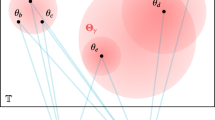Abstract
David Hull has demonstrated a marvelous ability to annoy everyone who caresabout science (or should), by forcing us to confront deep truths about howscience works. Credit, priority, precularities, and process weave together tomake the very fabric of science. As Hull's studies reveal, the story is bothmessier and more irritating than those limited by a single disciplinaryperspective generally admit. By itself history is interesting enough, andphilosophy valuable enough. But taken together, they do so much in tellingus about science and by puncturing the comfortable popular illusion abouthow science works. Ultimately, David Hull shows by his example thathistory and philosophy of science can make science better. I agree, and withits focus on the history of science in particular, this paper explores why.
Similar content being viewed by others
References
American Association for the Advancement of Science: 1990, Project 2061, Science for All Americans, Oxford, New York.
American Association for the Advancement of Science: 1993, Benchmarks for Science Literacy, Oxford University Press, New York.
Brush, S.: 1974, 'Should the History of Science by Rated?', Science 183, 1164-1172.
Burnham, J.C.: 1987, How Superstition Won and Science Lost: Popularizing Science and Health in the United States, Rutgers University Press, New Brunswick, NJ.
Conklin, E.G.: no date, unpublished memorial to Cornelia Clapp, on a file card, Marine Biological Laboratory Archives.
Desmond, A. and Moore, J.: 1991, Darwin. The Life of a Tormented Evolutionist, W.W. Norton, New York.
Ebert, J.: 1965, Interacting Systems in Development, Holt, Rinehart, and Winston, New York.
Executive Office of the President: 1997, Science and Technology. Shaping the Twenty-First Century, Report to Congress, U.S. Government, Washington DC.
Florman, S.C.: 1976, The Existential Pleasures of Engineering, St. Martin's, New York.
Gross, P.R. and Levitt, N.: 1994, Higher Superstition: The Academic Left and its Quarrels with Science, Johns Hopkins, Baltimore.
Holton, G.: 1973, Thematic Origins of Scientific Thought, Harvard, Cambridge.
Hull, D.L.: 1988, Science as a Process. An Evolutionary Account of the Social and Conceptual Development of Science, University of Chicago Press, Chicago.
Jacobson, M.: 1970, Developmental Neurobiology, Holt, Rinehart, and Winston, New York.
Kitcher, P.: 1993, The Advancement of Science. Science Without Legend, Objectivity Without Illusions, Oxford, New York.
Koestler, A.: 1959, The Sleepwalkers, Grosset and Dunlap, NewYork.
Mach, E.: 1960, The Science of Mechanics (translated by T.J. McCormack), Open Court, La Salle, IL.
Mayr, E.: 1982, The Growth of Biological Thought. Diversity, Evolution, and Inheritance, Harvard, Cambridge.
Morgan, T.H.: 1910a, 'Sex Limited Inheritance in Drosophila', Science 32, 120-122.
Morgan, T.H.: 1910b, 'Chromosomes and Heredity', Am. Naturalist 44, 593-655.
National Research Council: 1996, National Science Education Standards, National Academy Press, Washington DC.
National Science Foundation: 1996, Shaping the Future: New Expectations for Undergraduate Education in Science, Mathematics, Engineering, and Technology, Washington DC.
Oppenheimer, J.M.: 1967, The History of Embryology and Biology, MIT, Cambridge.
Sagan, C.: 1995, The Demon-Haunted World. Science as a Candle in the Dark, Random House, New York.
Sarton, G.: 1931, The History of Science and the New Humanism, Indiana, Bloomington. Science: 1995, Special issue on chromosomes, 270, 8 December.
Vitousek, P.M., Mooney, H.A., Lubchenco, J. and Melillo, J.M.: 1997, 'Human Domination of Earth's Ecosystems', Science 277 494-499.
Wachhorst, W.: 1982, Thomas Alva Edison, MIT, Cambridge.
Watson, J.D.: 1968, The Double Helix, Atheneum, New York.
Westfall, R.S., 1973: 'Newton and the Fudge Factor', Science 179, 751-758.
Williams, G.C. and Nesse, R.M.: 1994, Why We Get Sick: The New Science of Darwinian Medicine, Times Books, New York.
Wilson, E.O.: 1992, The Diversity of Life, Harvard, Cambridge.
Author information
Authors and Affiliations
Rights and permissions
About this article
Cite this article
Maienschein, J. ``Why Study History for Science?''. Biology & Philosophy 15, 339–348 (2000). https://doi.org/10.1023/A:1006733114136
Issue Date:
DOI: https://doi.org/10.1023/A:1006733114136




